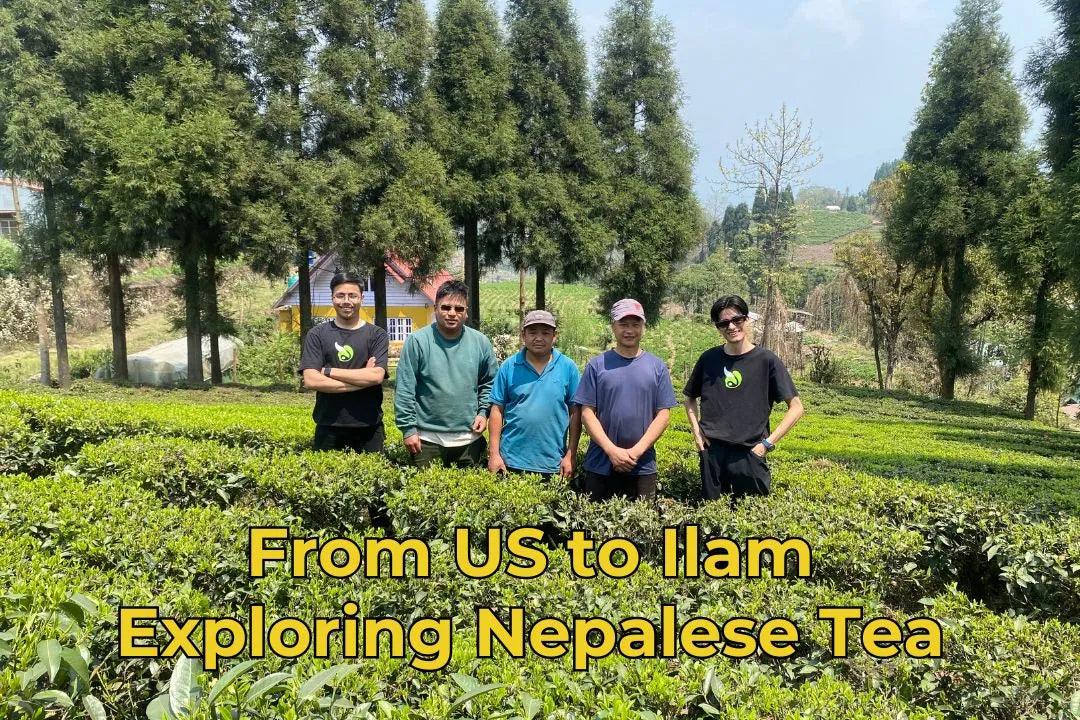
From the US to Ilam: Exploring Nepalese Tea
At Danfe Tea, our passion for delivering exceptional tea experiences recently took us from the bustling urban centers of the United States to the tranquil, verdant hills of Ilam in Nepal. This expedition was not just a quest for new flavors but a heartfelt journey into the heart of traditional tea cultivation that defines the essence of our brand.
Commitment to Authenticity and Quality
As a brand that prides itself on offering authentic, high-quality Nepal tea, we understand the importance of origin and craftsmanship in tea production. Our journey to Ilam was driven by a commitment to these principles, aiming to forge direct relationships with the local tea farmers and understand the intricate processes that go into creating each cup of tea we offer.
Discovering the Tea Gardens of Ilam
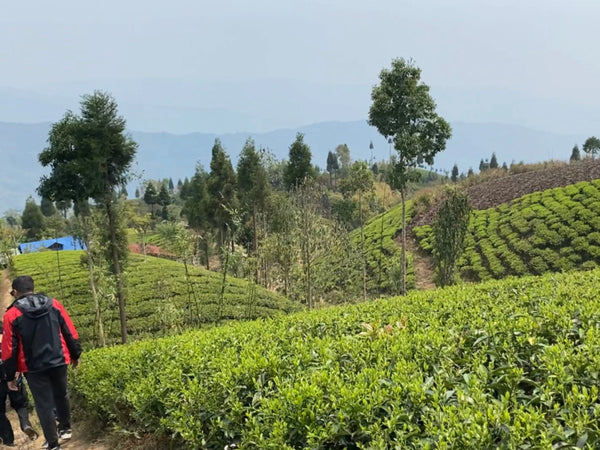
Tea Garden
Ilam, renowned for its lush tea gardens and contributing finest qualities tea production in Nepal, offered us more than just a picturesque setting—it provided a deeper insight into sustainable agricultural practices that align with our brand’s ethos. By visiting these gardens, we were able to witness firsthand the sustainable methods employed by local farmers, from organic farming techniques to the preservation of biodiversity within the tea estates.
The region's beauty, enhanced by its biodiversity and Himalayan views, provided a rich backdrop for our journey. This exploration deepened our commitment to sustainable practices and community support, ensuring that each cup of tea we offer carries the essence of Ilam’s unique landscape and cultural heritage.
Partnership and Collaboration
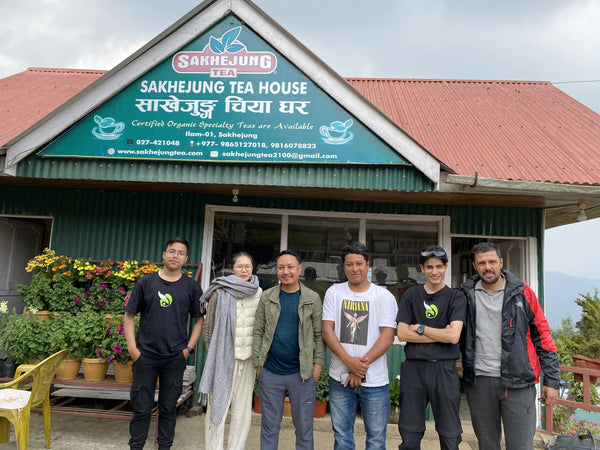
Team with Sakhejung Tea Estate
We connected with local tea producers to understand their challenges and goals. These important interactions help shape our partnerships, allowing us to support the local economy and deliver the finest Nepal tea to our customers. We are committed to fair trade practices and work hard to ensure our partnerships help local communities flourish while preserving their traditional methods.
We had the pleasure of meeting Mr. Yogesh Khatri, who is upholding his family's legacy at Sakhejung Tea Estate. As the cold of winter gave way, we witnessed the crucial first flush in early April, when the tea bushes begin to sprout their delicate buds. These buds are essential for crafting premium tea, and harvesting them requires careful precision, focusing on just the tender two leaves and a bud to preserve the tea’s superior quality. Mr. Khatri also took us through the expansive tea gardens and shared the processing techniques, providing us with valuable insights into the meticulous art of tea making.
Innovation in Tea Processing

Tea Processing Facility
During our visits to several tea processing facilities, we watched the fascinating transformation of raw tea leaves into fine tea products. This direct experience helped us grasp the nuances of different processing methods and their impact on the tea's flavor and quality. It inspired us to refine our own production techniques back home by integrating traditional methods that bring out the tea's natural flavors.
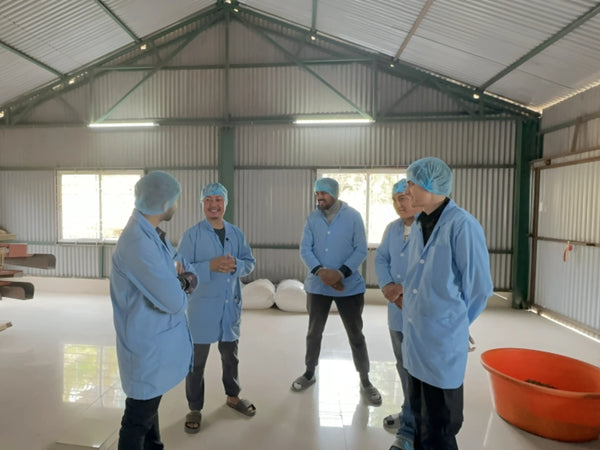
Discussion with Mr. Yogesh Khatri
Mr. Khatri's leadership was truly inspiring. He carefully supervised the harvest of the delicate buds, making sure only the best were selected. The careful process that followed included gentle withering, precise rolling, and meticulous drying to maintain the buds' subtle flavors. Watching this process, our team developed a greater appreciation for the dedication and passion that go into every batch of Sakhejung's first flush tea, capturing the true spirit of the Himalayas.
Comparing Ilam and Darjeeling Teas

Drinking Ilam Tea
Our visit also offered a fantastic opportunity to compare the teas of Ilam with those of neighboring Darjeeling. While both regions produce teas with remarkable complexity and reputation, the teas from Ilam, including those from Sakhejung, tend to have a slightly more pronounced floral aroma and a fresher, crisper flavor profile. This difference, although subtle, highlights the unique terroir of Ilam, characterized by its soil composition and climatic conditions, which are distinct from Darjeeling.
Challenges Faced By Tea Farmers in Ilam, Nepal
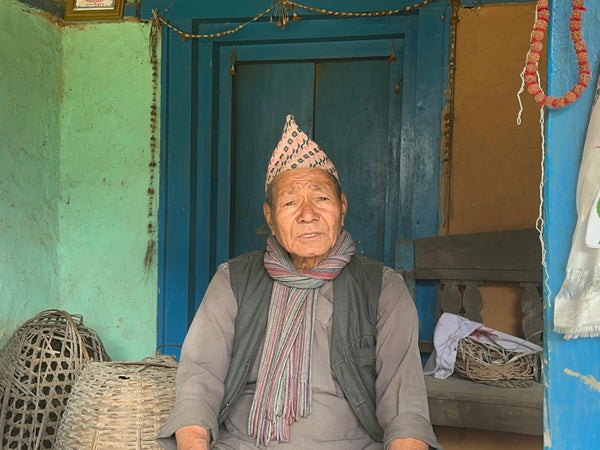
Conversation with Mr. Hari Bahadur
Our interactions with the local tea farmers in Ilam have provided us valuable insights into the various challenges they face. Mr. Hari bahadur, a local farmer, shares his disappointment in lack of facilities and opportunities they get in compared to other. who expresses his frustration over the lack of facilities and opportunities.
"Every leaf I pluck carries the story of my family, the soil of my ancestors," he often muses, a proud smile spreading across his weather-beaten face. But beneath that pride, there's a palpable strain, a quiet desperation that things must change for his children to have a future in these fields."I wish for my tea to travel beyond these hills, to be savored in lands I can only imagine," he says. His voice, roughened by years of work, carries a weight that speaks of both the love for his craft and the hardships endured.
These discussions have been instrumental in shaping our approach to partnerships and ensuring that we contribute positively to the local tea economy while maintaining high-quality standards. We've identified several critical issues during our discussions, which include:
1. Organic Certification and Costs
One of the primary challenges highlighted by the farmers is the high cost of organic certification. This certification is crucial for accessing international markets and commanding better prices, yet it remains financially out of reach for many small-scale farmers. The costs associated with maintaining organic standards, such as procuring organic fertilizers and bio-pesticides, add to the burden, making it difficult for farmers to fully embrace organic farming practices.
2. Technology and Skill Shortages
The lack of modern technology and skilled manpower in Ilam's tea sector significantly hampers production quality and quantity. Many farmers still rely on traditional methods, which, while rich in heritage, may not yield the efficiency or consistency required for competitive global markets.
3. Market Access and Pricing
The farmers also face challenges with market access and fair pricing. The lack of direct access to international markets forces many to sell their tea at lower prices to intermediaries. Additionally, the absence of a local auction house for tea in Nepal means that pricing often does not favor the farmers, with many not receiving a fair share of the final consumer price.
4. Government Support and Infrastructure
There is a notable lack of support from local and national government bodies in terms of infrastructure development, such as roads, irrigation, and electricity, which are essential for tea cultivation and processing. This lack of support extends to financial and technical assistance, leaving many farmers without the resources needed to improve their cultivation practices or expand their operations.
5. Environmental and Social Challenges
Climate change poses a significant risk, impacting the predictability of weather patterns and thus affecting crop yields. Additionally, the tea industry in Ilam, like many others, relies heavily on female labor, yet these workers often lack adequate social protections and benefits.
Our brand is committed to addressing these issues through sustainable practices and supportive partnerships to enhance the welfare and future of the Ilam tea community.
Curating a Unique Tea Collection
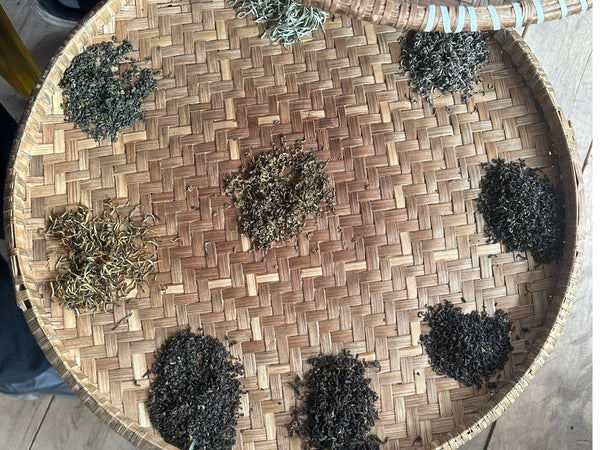
Collection of Ilam Tea Placed on Flat Round Woven Tray (Nanglo)
The culmination of our journey was the selection of distinct tea varieties that we are now proud to include in our special collection of Nepal tea. Each variety was chosen for its unique flavor, aroma, and the story it tells of its origin. From robust black teas to delicate white and green teas, our new range is curated to cater to the palates of tea connoisseurs and casual drinkers alike, offering a taste of Nepal’s rich tea heritage.
Sharing Our Journey
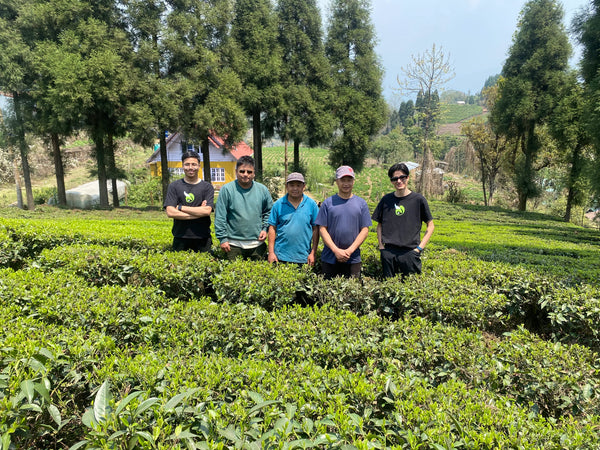
Team with Local Tea Sourcers
Upon returning, we are excited to share our journey through various channels, including our website, social media, and in-store presentations. We aim to educate our customers not just about the tea itself but about the rich cultural tapestry of Ilam and the stories of the people behind the tea leaves.
At Danfe Tea, we believe that every cup of tea should offer a journey, one that respects and celebrates its origins while delivering unparalleled quality and flavor. Our trip to Ilam has been a step forward in our ongoing mission to bring the world's finest teas to your doorstep, steeped with integrity, tradition, and a sense of adventure.










